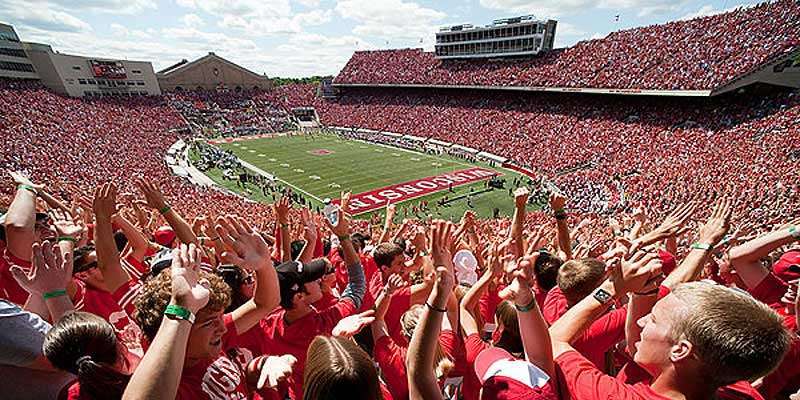Even with the emergence of the professional National Football League as the country’s favorite sport event, no one can argue that college football games are still big crowd drawers. True, there’s much pageantry that goes into the staging of these amateur athletic events, but that’s not all that make people want to keep watching them. There’s also no resisting the pull of decades-old traditions. There are just some things about college football that has made the game as much a part of the American psyche as apple pie and Fourth of July.
Here are some of the classic and best loved traditions of college football:
-
Kansas University’s “Rock, Chalk, Jayhawk.”
Chanting “Rock, Chalk, Jayhawk” at Kansas games has been the team’s official rally call for over a century now.
-
University of Hawaii’s Haka.
The university’s football team performs the haka, as stylized version of a traditional tribal war dance, before and after every game played on their home turf.
-
Florida University’s “Gator Chomp.”
Since 1981, Florida fans mimick the chomping of a gator’s mouth with their hands to spur their team to action, usually in sync with the marching band’s theme from “Jaws” rendition.
-
Oklahoma’s Sooner Schooner.
For close to 50 years now, the Sooner Schooner, the school’s official mascot, is raced around the football field pulled by two with ponies named Sooner and Boomer.
-
Auburn University’s War Eagle.
Since 1930, the university has a live eagle fly untethered over the football stadium at every football event. “War Eagle” is the battle cry of the Auburn Tigers.
-
Arkansas’ “Calling the Hogs” war cry.
Since the 1920s, Arkansas fans wave their hands over their heads and shout “Woo, Pig! Sooie,” a pig farmer’s typical hogg call, to spur their team to make a rally.
-
Colorado’s Ralphie the Buffalo.
Since 1967, a five-man team of students helps their mascot, Ralphie the buffalo, make histraditional run around the stadium before the start of each half.
-
“Script Ohio” formation.
Ohio State University’s marching band traditionally spell out “Ohio” in formation, with the honor for dotting the “i” reserved for the school’s local celebrities and alumni.
-
University of Wyoming’s “In Heaven There Is No Beer” song.
Fans sing along loudly and wildly to the team’s band’s favorite piece, “In Heaven There Is No Beer,” during every Cowboys’ game.
-
University of Toledo’s football cannon.
Since 1966, every time they make score, the Toledo Rockets fire their Civil War era cannon.
-
Throwing tortillas at Texas Tech matches.
No one knew when it started, but Red Raiders fans traditionally toss tortillas at the field at the kickoff of every match.
-
University of West Virginia’s “Take Me Home, Country Roads” anthem.
John Denver’s “Take Me Home, Country Roads” is sung after every winning game by players and students of the university since the inauguration of Mountainer Stadium in 1980.
-
University of Maryland’s Testudo.
Since 1932, Maryland players and coaches rub the nose of the 300-pound statue of Testudo, the university’s Diamondback terrapin mascot, for good luck before every game.
-
Notre Dame’s “Touchdown Jesus.”
Officially titled “The Word of Life,” the 134-foot mural at the southside of a tower showing Jesus seemingly signaling a touchdown is the most visible sight from the playing field at the Notre Dame Stadium.
-
Penn State’s Blue and White Uniform.
Since 1890, the school’s Nittany Lions’ football uniform has remain basically unaltered.
-
The Cotton Bowl Texas vs Oklahoma Game.
A yearly grudge match that began in 1932, the so-called “Red River Rivalry” is the traditional main event at the Texas State Fair.
-
The Army vs Navy.
The rivalry between the U.S. Military Academy and U.S. Naval Academy started 1890, making it one of the oldest tradition in college football history. The Army’s motto is “Beat Navy” and the Navy’s is “Beat Army.” At the end of the match, unlike other college football games, the theme songs of both teams’ alma maters are played – first that of the winner then that of the losing team – as sign of solidarity and mutual respect since they both represent the U.S. Armed Forces.
-
Georgia Tech’s “Ramblin Wreck.”
The school’s official mascot, a 1930 Ford Model A Sports Coupe dubbed “The Ramblin Wreck,” is traditionally used to lead the football to the playing field.
-
Kinnick Stadium’s pink locker room for the visiting teams.
Everything in the locker room for the visiting teams at Kinnick Stadium is done in pink in the hope that this color would dampen aggressive behavior and thus give Iowa the homecourt advantage.
-
Purdue University’s drum.
Touted as “The World’s Largest Drum,” Purdue’s mascot has been a staple at the school’s football games since 1921.
